The world is still in amazement over ex-military ruler Muhammadu Buhari’s wide margin victory against President Jonathan. This is a significant event for Nigeria’s democracy- and a huge win for the continent at large. Goodluck Jonathan’s quick congratulatory phone call to his successor and acceptance of his defeat is a noble and honorable gesture. This action is significant because, it calmed the looming tension that pre-existed the elections and most importantly sent a signal to anyone who wanted to seize the opportunity of his loss to cause unrest.
Is he a hero for this action? No. I believe he did the right thing, more rapidly than we would have normally expected of him. Nelson Mandela is a hero, president Jonathan did the right thing at the most appropriate time.
Despite the earlier postponement of the election, the tension leading up to the event, and the delay in result collation, things eventually panned out in a manner that was unexpected–peacefully. Nigeria in this instance acted as the big- brother of Africa by setting a standard for the rest of Africa and appears to be on the right path to a progressive democracy.
In less than two months, Goodluck Jonathan will be saying to his successor: good luck to you Mr. President. It is uncertain that Nigeria will ever have another president who will have the grace, support and goodwill Nigerians gave Jonathan. The accidental or “goodluck” president as referred to by many, had every reason to succeed, but let down many who had rallied round and made his victory in 2011 possible.
Here are six reasons why I believe President Goodluck Jonathan lost this election.
- The missing Chibok girls: Up until the disappearance of the kidnapped Chibok school girls, I never would have considered the idea of a president Buhari, particularly, with the horrific crimes against humanity he allegedly committed in his time as head of state. It didn’t
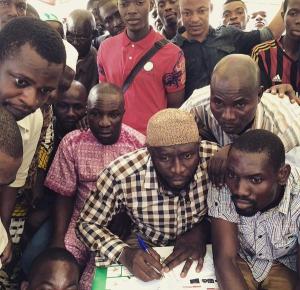
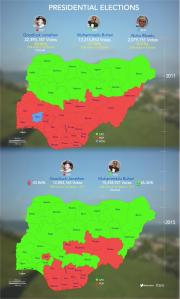
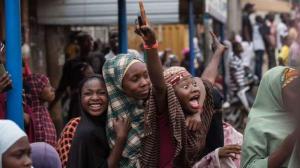
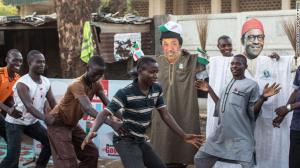

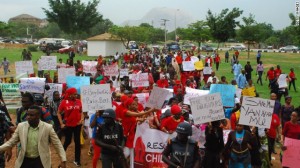
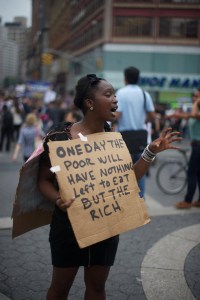
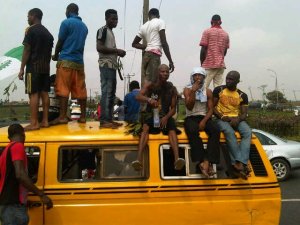 make sense to vote for him. But when little girls who are Nigerian citizens went missing and the president failed to acknowledge the situation and actions were not taken immediately to salvage the situation, it became obvious, that even we who supported Jonathan for whatever reason were ourselves not safe. Nigerians took to the streets and heavy social media campaigns started in an attempt to draw global attention, as our president failed to pay us any attention on this issue.
make sense to vote for him. But when little girls who are Nigerian citizens went missing and the president failed to acknowledge the situation and actions were not taken immediately to salvage the situation, it became obvious, that even we who supported Jonathan for whatever reason were ourselves not safe. Nigerians took to the streets and heavy social media campaigns started in an attempt to draw global attention, as our president failed to pay us any attention on this issue.
There were reports of the Nigerian police and army arresting and intimidating protesters for the bring-back-our-girls campaign. Jonathan quickly forgot that it was the same freedom to protest that ensured he became acting president when President Yar’Adua died in 2010. Such attempts were harmful to our growing democracy, seeking to oppress the very factor that demanded his constitutional right.
Let’s assume for a second that, as alleged, the bring-back-our-girls campaign was a scam, the idea of it was deserving of sympathy, but our president, failed those girls, failed their families and raised doubt in the minds of we who are still alive that he didn’t care about us and that he cannot be trusted.
- The Petroleum Minister’s bogus expenditure budget: In 2014, the petroleum minister Diezani-Allison Madueke was accused of running an expenditure of 500,000 euros (₦130 million) monthly on a personal private jet hire for the minister and her family. Although the Nigerian National Petroleum Commission rose to her defense saying that it was common practice and she had a right to do so, never in Nigeria’s history had this ever happened and publicly defended. These allegations got a lot of attention from the public; still the president deemed it unnecessary to respond to Nigerians. The president, made it seem like Nigerians didn’t have a right to question these things and he couldn’t be bothered to address such concerns.
- Boko Haram and the disregard of victims: Unfortunately for Jonathan, he inherited a security crisis plaguing the country. When Boko haram began, it was an uprising of the poor, neglected unemployed youths fueled by religion that picked up arms against their government. Eventually, boko haram became an “organized crime” group that government by neglecting, allowed to grow, eventually becoming untameable. Jonathan’s method of handling this crisis was cold, inactive and simply not enough. Hundred thousands of Nigerians died like their lives meant nothing and the government is still yet to have a tangible plan to accommodate and integrate the internally displaced Nigerians back into the system. The attempt to postpone the election in order for the government to tackle boko haram was four years too late and somewhat suspicious. If Jonathan could stand back in indifference and watch this happen, then to many supporters and undecided voters, he couldn’t be trusted with their lives.
- The Allegedly missing $20B: Allison Diezani Madueke and the alleged Missing 20 Billion dollars; In March 2014, a midst an accusation by the former CBN governor, Sanusi Lamido Sanusi that 20 billion dollars was unaccounted for and missing from the federal account, Sahara reporters allegedly uncovered a plot by the president and the petroleum minister to hand over the country’s oil asset to themselves and their group of friends. Still, the president was quick to dismiss this issue and the finance minister Ngozi Okonjo Iweala discredited Sanusi’s claim, placing the unaccounted figure at $10.8B. In an attempt to exonerate itself, the federal government presented a Price Water Coopers audit of the federal account covering the alleged period. This report vaguely explained the situation, raising a lot of unanswered questions, but the case has since been overlooked in the usual Nigerian manner.
- Insensitivity of the First Lady: Our diversity makes tribalism a common thing that often goes unnoticed as it’s never publicly displayed. Never in Nigeria’s history has any government incited tribes against tribes and religion against religion as Goodluck’s administration did. On several occasions as implied by their speeches during the campaign period, both the president and first lady, set Nigerians against each other, disrespected other tribes, and even mocked the Almajiri children in the north. The first lady on an occasion said “our men (south-south men) don’t have numerous children deserted to roam the streets”. Such a statement is disrespectful and indicates ethnic superiority.
- Fueling Corruption: Majority of the actions taken by president was leading Nigeria down the path of heavy injustice and illegal practices. More recently, sahara reporters released an audio alleging that the president ordered senator Obanikoro to rig the governorship election in Ekiti state in favor of the PDP candidate. Although, the senate voted against this case making it to court, the president has since nominated senator Obanikoro for ministerial appointment, ignoring the audio recording evidence indicting Obanikoro of committing a crime. Such actions reinforces that Nigeria was slowly falling into lawlessness and anarchy under Goodluck Jonathan’s leadership.
By all indications, Jonathan’s administration ticked all the boxes for factors that drive conflicts, feeds corruption and could ultimately stifle economic growth in a complex complicated nation such as Nigeria. Poor governances, marginalization, lack of voice, and lack of government accountability support the notion that this administration fuels corruption and lawlessness. The moral of this being it’s no longer business as usual, therefore, African leaders must stop taking their citizens for granted.
Buhari’s victory in some Christian dominated northern states such as Kaduna and Benue state reinforced the idea that Nigerians were aggrieved and willing to look beyond the alleged brutality of an ex-military leader. President elect Muhammadu Buhari in his post victory interview with CNN’s Christiane Amanpour on the issue said “I was a military leader and I have since learnt a lot and become a converted democrat”.
Nigerians are hopeful and graceful, willing to give Buhari a second chance; it is now up to Buhari to prove to us that we made the right choice.

Outstanding Analysis! Looking forward to your upcoming views & coverage.
This is not far from the truth… I think the most important thing right now is that the majority of Nigerians are happy with the election result and the emerged winner 🙂